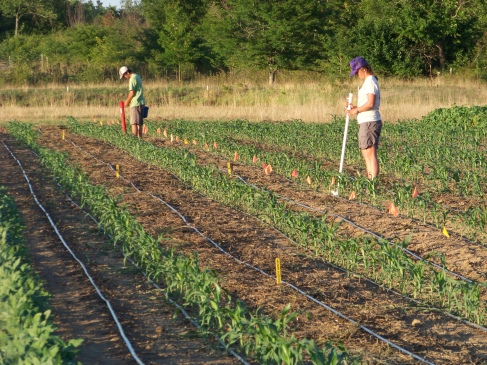Turn empty space into food, feed the people of Pacifica.
| No-till from prior season, and growing corn |
 |
| Drip systems, no-till and growing veggies |
"No-till farming" sounds pretty dull at first. The term basically describes ways to grow crops each year without disturbing the soil through tillage or plowing. But it's an important idea. Plowing and tillage are major sources of soil erosion around the world — they were key factors behind the Dust Bowl in the 1930s. What's more, churning up all that soil can release a significant amount of carbon dioxide into the atmosphere, helping to warm the planet. So, since the 1980s, more and more American farmers (and policymakers) have started taking no-till farming seriously." Washington Post/Brad Plumer, 11/9/13, "No-till farming is on the rise. That's actually a big deal." Read article.
| Mowing down prior growth, that was fun |
 |
| The sustainable agriculture cycle |
Related - Kerr Center, 7/27/12, "Horticulture happenings: three sisters and no-till vegetable beds." .... "This past week we began preparing for another field demonstration: no-till vegetable beds. Inspired by a visit to a no-till vegetable market farm in Eureka Springs, Arkansas, called Foundation Farm, we decided to create a few no-till vegetable beds to add to our field projects. We will be teaching about no-till farming and gardening using these beds, which will be planted to vegetables in the Spring."
Mother Earth News/Editors/May/June 1984, "No-till farming pros and cons." The agricultural industry is converting to this new and (on the surface, at least) better method."
Note photographs and graphic: left side from Kerr Center (above), right side upper from AG sense (agricultural network), Sustainable graph from Western Cape Government Agriculture (Africa).
Submitted by Bob Hutchinson
Posted by Kathy Meeh


1 comment:
Many scientists believe that adopting no till farming could reverse climate change.
What does thin mean in Pacifica? We can stop wasting time and recourses on things that make little difference, and concentrate on things like this that will make a major change in total atmospheric carbon.
"UNEP estimates that no-tillage operations in the United States have helped avoid 241 million metric tons of carbon-dioxide since the 1970s. That's equivalent to the annual emissions of about 50 million cars. What's more, the practice could help farmers deal with drought, which may become more prevalent in parts of the world if the planet keeps heating up."
www.washingtonpost.com/blogs/wonkblog/wp/2013/11/09/no-till-farming-is-on-the-rise-thats-actually-a-big-deal/
Post a Comment